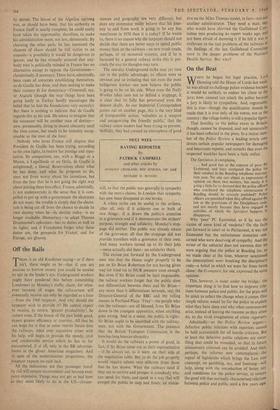Off the Rails
rrHEREis an old Kurdistan saying—or if there 1 isn't, there ought to be—that if you are anxious to borrow money you would be unwise to spit in the lender's eye. Underground workers might have pondered this before committing Londoners to Monday's traffic chaos; for what- ever increase of wages the railwaymen will eventually receive can only be regarded as a loan —from the 1960 taxpayer. And why should the taxpayer wish to provide it? He cannot expect to receive, in return, 'greater productivity'; he cannot even, if the lesson of the past holds good, expect greater efficiency or courtesy. All that he can hope for is that at some remote future date the railways, tided over successive crises with his help, will begin to provide the speedy, civil and comfortable service which he has so far encountered, if at all, only in the BR advertise- ments in the glossy American magazines. And in spite of the modernisation programme, the taxpayer expects no such luck.
All the indications arc that passenger travel by rail will remain inconvenient and become even more expensive. Things may not get as bad here as they seem likely to do in the US--circum- will, so that the public was generally in sympathy with the men's claims. In London that sympathy has now been dissipated at one stroke.
A token strike can be useful to the strikers, after all, only if it achieves one or both of two things: if it draws the public's attention to a grievance and if it demonstrates the strikers' purpose, strength and solidarity. Monday's stop- page did neither. The public was already aware of the grievance; all that the stoppage did was provide travellers with a grievance of their own. And many workers turned up to do their jobs --some actually did. them : no solidarity there.
The excuse put forward by the Underground men was that the blame' ought properly to be put on Sir Brian Robertson for not having given way (or tried to) to NUR pressure soon enough. But even if Sir Brian could be held responsible, the railway workers forget that the public does not differentiate between them and Sir Brian— any more than it differentiates between, say, the Director-General of the BBC and the toiling masses in Portland Place. They'—the people who . run the railways—are all blamed, from Sir Brian down to the youngest apprentice, when anything goes wrong. And in a sense, the public is right: Sir Brian ought to be identified with the railway- men, not with the Government. The pretence that the British' Transport Commission is the boss has long been an absurdity.
It would do the railways a power of good, in fact, if Sir Brian came out as their representative ---if he always sat, as it were, on their side of the negotiation table. But to do the job properly would require talents very different from those that he has shown. What the railways need if they are to survive and prosper is somebody who can speak for them, and speak in a way that will compel the public to stop and listen; an execu- stances and geography are very different; but does any commuter really believe that his jour- ney to and from work is going to be any less wearisome in 1970 than it is today? If he wants to, there is no reason why the taxpayer should not decide that there are better ways to spend public money than on the railways—on new trunk roads, perhaps, or on monorail systems; and if he is harassed by a general railway strike this is pre- cisely the way his thoughts may turn.
The one-day Underground strike may yet turn out to the public advantage; its effects were so obvious and so irritating that not even the most belligerent worker can now believe the public is going to be on his side. When even the Daily Worker takes care not to defend a stoppage, it is clear that its folly has penetrated even the densest skulls. As our Industrial Correspondent points out on another page, this is the very kind of irresponsible action, 'valueless as a weapon and antagonising the friendly public,' that the railway union leaders had been trying to prevent. Skilfully, they had created an atmosphere of good NEXT WEEK RAVING REPORTER By PATRICK CAMPBELL and other articles by s\ tier.) (ROSLAND, ROY JENKINS, MP, and RICHARD II. ROVERE five on the Miles Thomas model, in fact—not just another administrator. They need a man, saY, who would have chivvied the Guillebaud Com- mittee into producing its report weeks ago, and not been afraid of damning it if he felt it was as irrelevant to the real problems of the railways as the findings of the last Guillebaud Committee were to the deeper problems of the Nation 11 Health Service. But who?










































 Previous page
Previous page